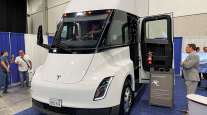Tesla’s ‘Mind-Boggling’ Value Leads Bernstein to Downgrade

[Ensure you have all the info you need in these unprecedented times. Subscribe now.]
Tesla Inc.’s soaring valuation led to a downgrade by Sanford C. Bernstein analyst Toni Sacconaghi on July 28, who said it is difficult to justify the market capitalization even using best-case scenarios.
The electric-vehicle maker’s shares have been rallying the past few months, at one point pushing Tesla’s valuation past $300 billion, fueled by investor optimism over strong second-quarter results, the stock’s possible inclusion into the S&P 500 Index and potential announcements about new battery technology.
Yet analysts and market experts have still struggled to explain the meteoric rise in the stock price, and have said it was detached from reality.
“Let us be clear: this is a valuation call,” Sacconaghi wrote in a note to clients. The analyst noted, however, that trying to predict Tesla’s stock direction in the near term could be a “fool’s game.”
“Expectations appear achievable/beatable, the forthcoming Battery Day could be noteworthy, and there is strong price momentum in both Tesla and among growth stocks more broadly,” the analyst said.
But valuation will matter at some point. Given high expectations, Sacconaghi worries about risks from a potential cannibalization of Model 3 by the newer Model Y and the impact of electric vehicle competition on investor sentiment.
The analyst wonders if Tesla can roll out enough new models at lower price points to sustain a growth rate above 30% for several years. Sacconaghi lowered his rating to the equivalent of a sell from hold, and maintained his price target of $900, representing a 42% discount to close July 27.
Sacconaghi said he would change his mind if Tesla ultimately demonstrates unique progress in autonomous driving or other software, leading to high margins over time.
The current valuation has led some investors to start valuing Tesla as if it were a technology stock. As Sacconaghi noted, its market cap is now bigger than Toyota and Volkswagen combined. The two collectively make more than 20 million cars per year, compared to Tesla’s expectation for about 500,000 cars this year.
The share price is “up nearly 500% in less than a year — unprecedented for a large cap stock outside of the tech bubble.”
Tesla shares were down 2.1% to $1,507.30 premarket July 28. The stock has gained 268% this year, while the S&P 500 Index is largely unchanged.
Separately, Tesla said in a regulatory filing early July 28 that it has cleared out its balance of deferred revenue related to sales of regulatory credits to other automakers. Without the sale of credits to automakers that are out of compliance with emissions rules, Tesla wouldn’t have earned a profit last quarter.
Chief Financial Officer Zachary Kirkhorn said last week that while Tesla expects regulatory credit revenue to roughly double this year, it assumes those sales won’t make a significant contribution to the business in the future. Deferred revenue went to zero as of June 30, from $140 million at the end of the first quarter.
Want more news? Listen to today's daily briefing:
Subscribe: Apple Podcasts | Spotify | Amazon Alexa | Google Assistant | More




